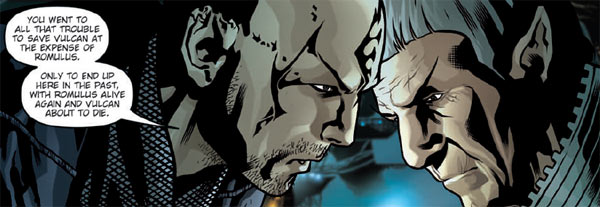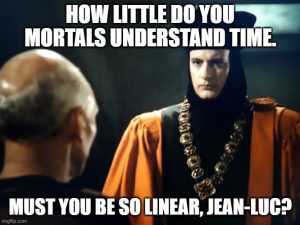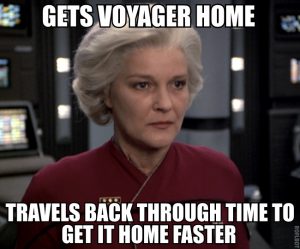
Picard, Time Travel & Moral Motivation
The first season of Star Trek: Picard is more than half-way through now. I’ve thoroughly enjoyed being back in Picard’s world. However, I have a gripe! The series entrenches the destruction of Romulus into the history. We were already familiar with the destruction of Romulus from J. J. Abrams’s 2009 Star Trek. In that film, it is established that shortly after the destruction of the Romulan homeworld, Nero – the villain of that story – travels back in time, leading to the creation of what has become known as the “Kelvin timeline”.

With the movies taking place in the Kelvin timeline, and Picard taking place in the original timeline, commencing after Nero has travelled back in time, it is established that both of these timelines exist. All well and good, right?
Wrong. This leads to some horrible implications over the whole of Star Trek. Let me explain.
The Timelines
Nero accidentally travels back in time from 2387, arriving in 2258. As Zachary Quinto’s Spock explains,
Nero’s very presence has altered the flow of history, beginning with the attack on the USS Kelvin, culminating in the events of today, thereby creating an entire new chain of incidents that cannot be anticipated by either party.[1]
This lets the audience know that the universe won’t – or need not – turn out as they remembered from classic Star Trek. This is nice, because we can’t sit back happily knowing what’s going to happen.
But here Spock talks of Nero altering the flow of history. This suggests that the timeline was one way, and Nero’s travelling back in time has changed it. For one thing, Nero destroys Vulcan because he blames the Federation and Spock for the destruction of his own homeworld and wants revenge.
The storyline of Picard takes place after Nero has gone back in time, in 2399. So, we know that the timeline continued after Nero’s travelling back in time. And it continues with the same history it always had. In Picard’s history books, there is no mention of Nero encountering Starfleet in the 23rd century. Vulcan is still intact. Everything has simply continued as normal, it seems, but without Nero and Spock (who presumably everyone thinks have mysteriously disappeared).
So, we have two timelines. “What’s the problem?” I hear you ask. Well, I’ll tell you!

What a Mess
For one, this is incongruous with lots of other instances of time travel in Star Trek. In First Contact, for instance, the Enterprise-E Borg sphere goes back in time. While somehow protected in a “temporal wake”, they see the effects of the Borg sphere travelling back; they see an Earth assimilated. As Data says, Earth then has a “population of nine billion, all Borg”.[2] Presumably the Enterprise didn’t magically jump from one timeline to another here, so what would explain this? The obvious thought is that there is one timeline, and the Borg sphere altered it by preventing Zefram Cochrane’s launch and advancing humanity’s first encounter with the Borg by hundreds of years.
However, if it is the case that when you go back in time, rather than altering the timeline, you create another, this doesn’t make sense. What the Enterprise-E crew should have seen was everything continuing as normal – at least in their timeline. The Borg assimilation of Earth would have taken place in an entirely different timeline, as with Nero’s destruction of Vulcan.
Perhaps there is some way that we could explain this. Maybe sometimes – in special cases perhaps – going back in time creates a new timeline, but not always. As an explanation goes, however, that seems to raise more questions than answers!
Alternatively, we might think that this was a mistake, and we should ignore it like we do lots of other gaffes from writers. Sticking with First Contact, for instance, the Borg would be pretty stupid if they decided to invade 24th century Earth then go back in time, rather than going back to the 21st century and attacking the then-relatively-defenceless Earth. We tend to forgive things like this because we care about the general story. So a mystery of how the Enterprise-E could see what should have been in another timeline is maybe just something we should sweep under the rug.
Picard seems to commit us to the idea that when you change something in the past, a new timeline is formed, branching away from the old one. But both timelines exist.
However, the entire show of Picard is based on the premise that the destruction of Romulus happened, Nero went back in time, but things are still going on in the timeline as if everything was normal. So, it looks like we might have to accept this notion of time travel (with possible exceptions for looping cases, like in Time’s Arrow, where a person’s going back in time doesn’t change anything, because they were there already). [Editor's note: for more on time travel where you don't change the past, see the discussion here]
So, to clarify, it looked like Star Trek was endorsing a model where you could overwrite what happens in the past, replacing it with new events. But Picard seems to commit us to the idea that when you change something in the past, a new timeline is formed, branching away from the old one. But both timelines exist (hence the events of Picard happening).
Moral Motivation
However, I really don’t like this model, largely because of what it means for moral motivation in loads of classic Star Trek. There have been a lot of episodes over the various series that have made use of time travel. In fact, there have been so many that you could rank a top 15. In most of these, something bad happens, and our heroes try to prevent it from happening. Or so we thought.

For example, consider Endgame, the finale of Star Trek Voyager. We discover that Janeway did get Voyager home in 2394, but lost many of the crew along the way, including Seven of Nine. In 2404, Admiral Janeway gets her hands on some time travel technology and uses it to meet with Voyager back in 2378. With the help of 25th century technology, she is able to get the crew home earlier, motivated principally by her desire to save Seven of Nine.
The branching model – in which a new timeline is created, via time travel, in addition to the original - changes the situation. The timeline where Seven of Nine died presumably continues. Janeway no longer saves Seven, but creates a whole new one, and a whole new universe along with her! In the First Contact case, things look even weirder. Rather than Picard restoring the timeline, if both timelines exist regardless, what he’s actually doing is deciding what timeline he wants to live in. This is hardly the noble goal that it looked like before.
Another example features in The New Generation’s Firstborn. In that episode, a mysterious Klingon, K’mtar, comes aboard the Enterprise to help Worf and Alexander. We discover through the episode that K’mtar is actually a future version of Alexander, who, wracked with guilt for events that led to his father dying, tries to fix this. But, if the timeline he comes from will exist no matter what, he doesn’t really fix anything. His father did still die. Nothing is altered there.
This seems to get something wrong about the characters’ motives. Janeway wants to save Seven. And in First Contact, Picard wants to stop the Borg from having assimilated Earth. Yet under the new model, that’s not really what’s happened at all.
And it gets weirder
Maybe all of this doesn’t bother you. Perhaps this seems fine. And bringing a new timeline into existence that has certain features isn’t so bad.
But when we think about how this affects how we should live, things can start to look weirder. Lots of philosophers (just like normal people!) are interested in how we should live our lives. What makes it good to act one way, or another? What makes a certain way of living right or wrong? What is the good life (if there is such a thing)? A popular response to this is the consequentialist solution. For the consequentialist, what you should do is make the world better. In fact, consequentialists usually think that what we have to do, morally speaking, is make the world as good as we can. So, if you’ve got two options before you, and one of them makes the world better than the other, that’s the one you should pick. Usually, consequences happen after you act, but when we think about backwards time travel, this need not be the case.
And when we think about the consequences of Nero going back in time, if he creates a whole new timeline, in addition to the one that already existed, we’ve got a whole universe of extra things in our ontology (the things that exist). So, we might think that he made the world (or more accurately, the complete set of things that exist) better, even though he destroyed Vulcan!

The consequentialist is likely to think even weirder things than that, if we have this model of time travel. Because they think you should cause everything to be as good as possible, if we think two universes are better than one, it looks like they have to say you’re morally required to make more universes. So long as, in total, the extra universe you create by going back in time is on the whole a good thing, it seems like that’s what you have to do!
Maybe we don’t actually think the world is that great, but most people seem to think it’s at least a good thing that it exists rather than nothing. Gottfried Leibniz actually thought that the world we’re in is the best of all possible worlds.[3] If he’s right that we live in the best of all possible worlds, then even worlds close to ours would be pretty good, so we should make more of them!
Janeway no longer saves Seven, but creates a whole new one, and a whole new universe along with her!
And if I happen to have a time machine, and I think the universe is a good thing, it looks like I have an interesting choice ahead of me. I could try to continue in my current timeline, making it as happy as possible. Alternatively, I could go back in time and make a very tiny change. Perhaps one so insignificant that all the people in the new timeline will be pretty much exactly the same (maybe quantum events would take place differently?). This would in effect make the amount of happiness in this timeline since the branching point (and for the entire future ahead) happen twice. And I could keep doing this, sending grains of sand to very distant points in the universe fifty years ago, creating a new universe every time.
This strikes me as super weird. That in itself doesn’t give us any reason to believe it’s a bad model of time travel. But it does mean that whenever one of our heroes ‘goes back in time to fix things’, they’ve not fixed things at all. Instead, they’ve seen a timeline they don’t like and decided to leave and join a new one. This is hardly the exemplary behaviour I’ve come to expect from my protagonists!
Footnotes
[1] https://memory-alpha.fandom.com/wiki/Alternate_reality
[2] Star Trek: First Contact.
[3] Gottfried Leibniz, Monadology.
Further Reading
If you’re interested in learning more about what philosophers say about time travel, a great place to start is David Lewis, The Paradoxes of Time Travel, American Philosophical Quarterly Vol. 13 No. 2 (1976), pp. 145-152.
For more on consequentialism (outside of time travel questions), and why people find it plausible, it’s worth checking out the Internet Encylopedia of Philosophy entry. For more in-depth information on moral motivation, see the SEP entry.
No comments
Start the conversation…